Mexico City is one of the most vibrant and exciting capitals in the world. It is also one of the most populous, congested, and polluted cities in the world. However, that does not mean that you cannot enjoy Mexico City as an eco-friendly traveler. In fact, there are many ways to experience the cultural, historical, and natural wonders of Mexico City while minimizing your environmental impact and supporting sustainable tourism practices.
In this article, we will provide you with an eco-friendly experience guide to Mexico City, covering where to enjoy authentic cuisine, sleep comfortably at night, and reflect on days full of adventure and laughter. Whether you are a seasoned traveler or a first-time visitor, you will find something to suit your interests and preferences in this eco-friendly experience guide to Mexico City.
Eco-friendly Hotels and Hostels in Mexico City
El Patio 77
Since opening its doors in 2009, El Patio 77 has stood as the only eco-friendly Bed & Breakfast in Mexico City and has continued to set the bar for sustainable tourism. Built in 1890, this mansion, like many Porfirian-style homes in the San Rafael neighborhood, had been neglected for decades until it was affectionately renovated to both preserve its history and adapt to the needs of this era. The ornate design of El Patio 77 pays homage to its French and Neoclassical history, while adding a touch of urban flare and Mexican traditionalism.
The eight intentionally designed rooms are named after specific Mexican states, each with decor reflecting the artistic traditions of that region. You can feel the creaking of the 100-year-old rustic, wooden floorboards underneath you as you walk down one of the hotel’s original staircases. The 14-foot high boveda brick ceilings and the grandiose nine-foot doors make small spaces feel exceptionally spacious. Further, common areas have been designed to create a calm and tranquil atmosphere with the use of natural light and greenery.
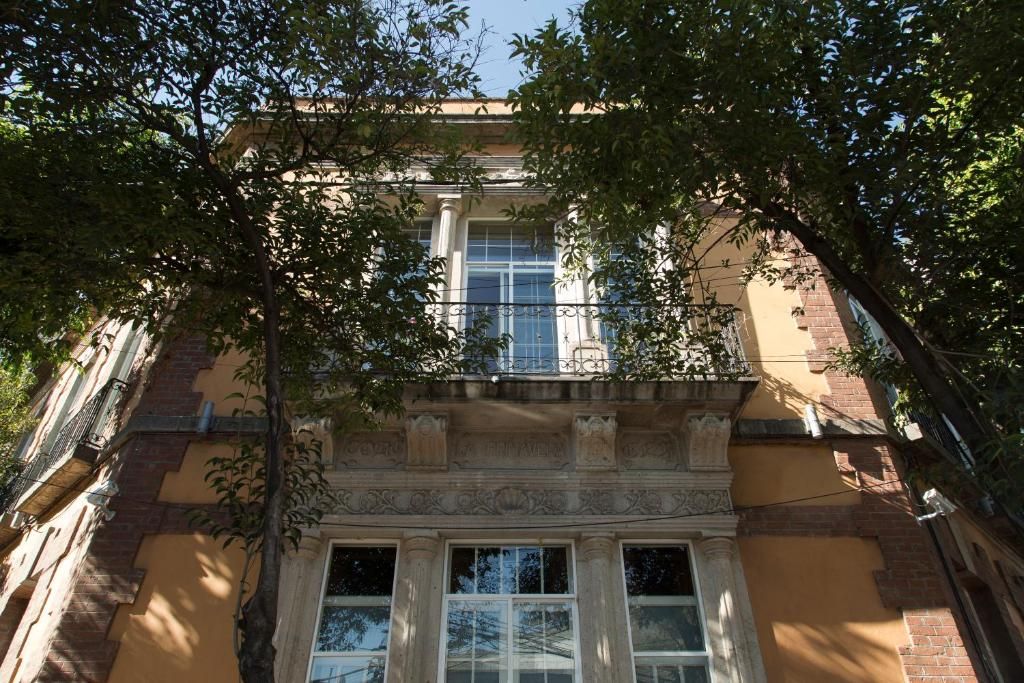
In the centralized neighborhood of San Rafael, El Patio 77 is strategically positioned between several tourist hotspots, including Paseo de La Reforma and El Centro Histórico. At check-in, you are given a specially-designed hotel map showing the most popular neighborhoods, as well as recommendations of where to eat. During your stay, a lovely breakfast of local fruits and pancakes accompanied by coffee and juice is served every morning from 8:00 AM to 10:00 AM in the main courtyard.
If you are looking for a guided experience, the hotel works with local tour companies to offer an extensive selection of experiences, including walking tours of various neighborhoods, market food tours, day trips to Puebla and Taxco, and hot air balloon rides over the Teotihuacan Pyramids. After a day full of adventure, find a moment of relaxation and book a massage with one of the hotel’s qualified masseuses (package options include therapeutic, Swedish, Thai, ayurvedic, and reflexology for the hands and feet).
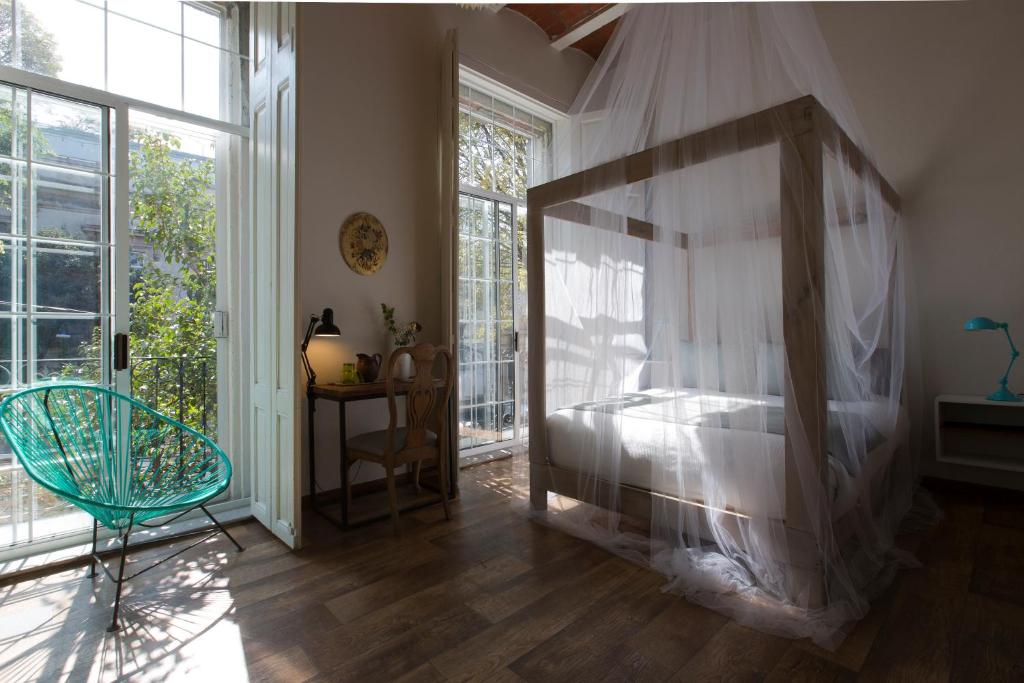
Aside from offering its guests a comfortable stay, sustainability is the utmost priority at El Patio 77. Signs have been posted in common areas and bathrooms, educating guests of the water crisis in Mexico City and ways that they can be conscious of their water consumption. All water is warmed by two solar heaters installed on the roof, which are positioned alongside a biological water harvesting system that collects rainwater. Further, biodegradable shower gel, hand soap, and shampoo are provided in all bathrooms, which guests are encouraged to use during their stay.
One of the most notable additions to the hotel is the greywater filtration and purification system that treats and reuses shower and sink water for toilet use. Further, many light fixtures and pieces of furniture were made from repurposed material. El Patio 77’s dedication to sustainable tourism in Mexico is nothing short of inspiring and is most duly expressed on the front page of their welcome packet: “In these walls, we try to integrate a community of travelers with an interest in Mexico’s vast art and culture, while respecting our primordial housing, the Earth. What history will you leave in these walls?”
Hostel Mundo Joven Catedral
Situated directly behind the stunning Metropolitan Cathedral, Hostel Mundo Joven is not only centrally located, but its colonial walls have been a mainstay for backpackers for the past 15 years. Offering female-only, male-only, and coed dorms, as well as private rooms sleeping two to four people, the hostel provides a little something for everyone. The rooftop terrace delivers spectacular views of the Cathedral, the Zócalo (Mexico City’s main square), and the majestic skyline of the historical center.
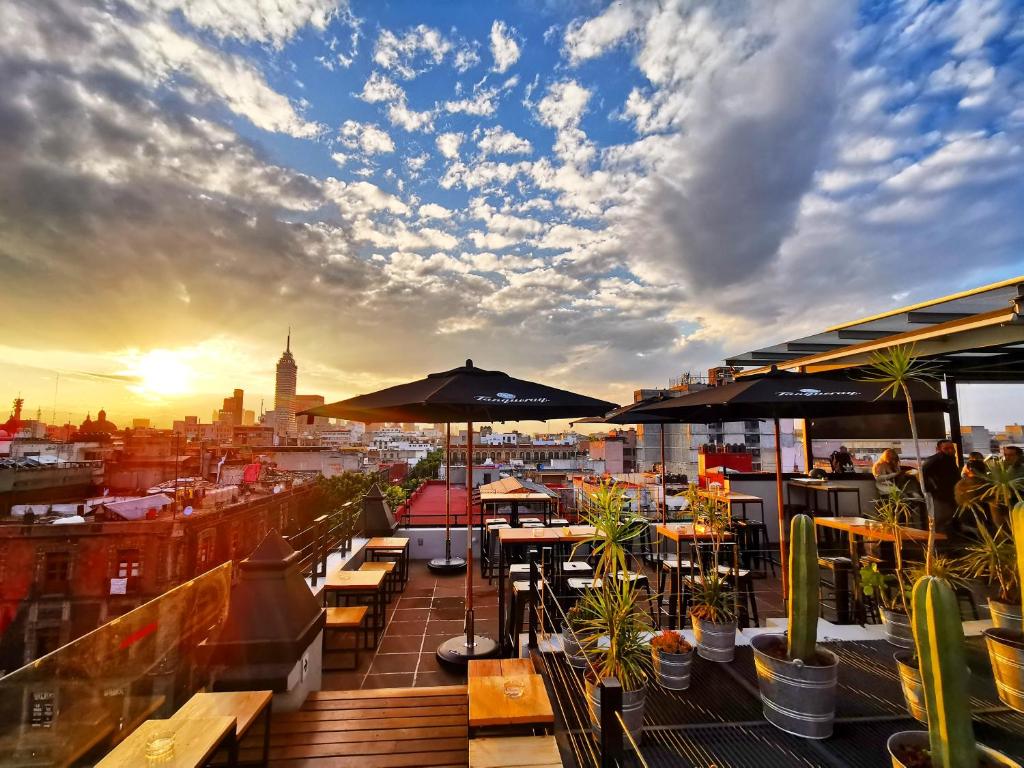
The space is also used for weekly events, in which the full bar is open for business. Watch as mixologists take mint leaves from their humble organic garden to conjure up the perfect mojito. Boredom will never be an issue during your stay at Hostel Mundo Joven, as their list of activities is extensive. A free, daily walking tour shows off the most historical sites, as well as visits to the local markets to experience some of the best food in the world! The hostel also provides Eco Bici cards to use the city’s bike-sharing system – there is an Eco Bici station right outside the hostel.
If learning a bit of Spanish is high on your list, the hostel can arrange Survival Spanish classes, in which local teachers give private or group classes for reasonable rates. The last couple of years have brought about major changes toward more green practices at the hostel. All bulbs have been changed to LED and movement sensors have been installed in common areas and hallways. Management is currently in the process of installing solar panels on the roof, which should be fully operational in a few months.
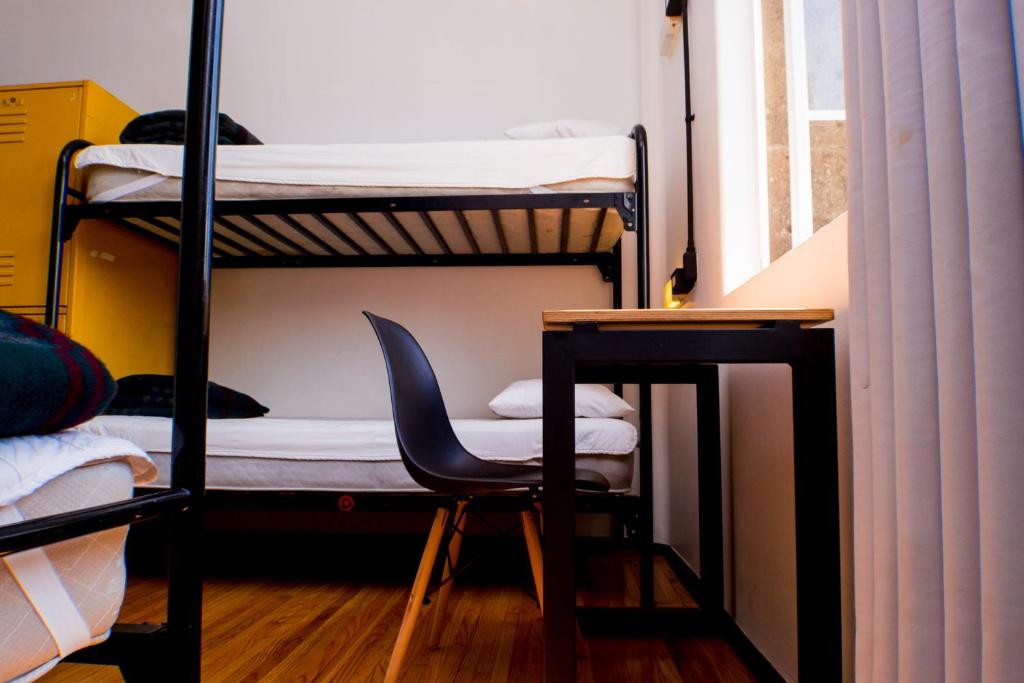
In terms of water usage, all faucets require you to push a button while washing your hands and similarly, taking a shower involves having to press a button to receive 10-15 seconds of water at a time. All detergent and shampoo sold at the front desk is ecological, and there is a 50 peso deposit charged with every towel you use. Further, their laundry service company must follow strict eco-friendly standards to be able to work with Hostel Mundo Joven. Lastly, as members of Hosteling International, Hostel Mundo Joven gives you the option to make a voluntary donation at the time of booking (between $2.50 – $20.00) to help offset the carbon emissions caused by your overnight stay.
Hostel Suites DF
Tucked away on a sleepy street between Paseo de La Reforma and Monumento de La Revolución, this cozy hostel prides itself on offering a warm and homey welcome to its guests. Hostel Suites DF has an option for every traveler – female-only, male-only, coed dorms, as well as private and family rooms complete with private showers and bathrooms. The kitchen is compact and basic. However, with the endless options for cheap eats in the city, it is unlikely that you will need to do much cooking during your stay.
In the evenings, you can find world travelers chatting over a cold beer in one of the hostel’s two outdoor terraces. A complimentary breakfast of pancakes, fruit, and juice (all made with local ingredients) is served between 8:00 AM and 10:00 AM. The homemade blackberry marmalade and robust coffee from Veracruz are delightful. Hostel Suites DF is also part of the Hostelling International family, and at the time of booking, travelers are given the option to make a voluntary donation (between $2.50 – $20.00) to help offset the carbon emissions caused by their overnight stay.
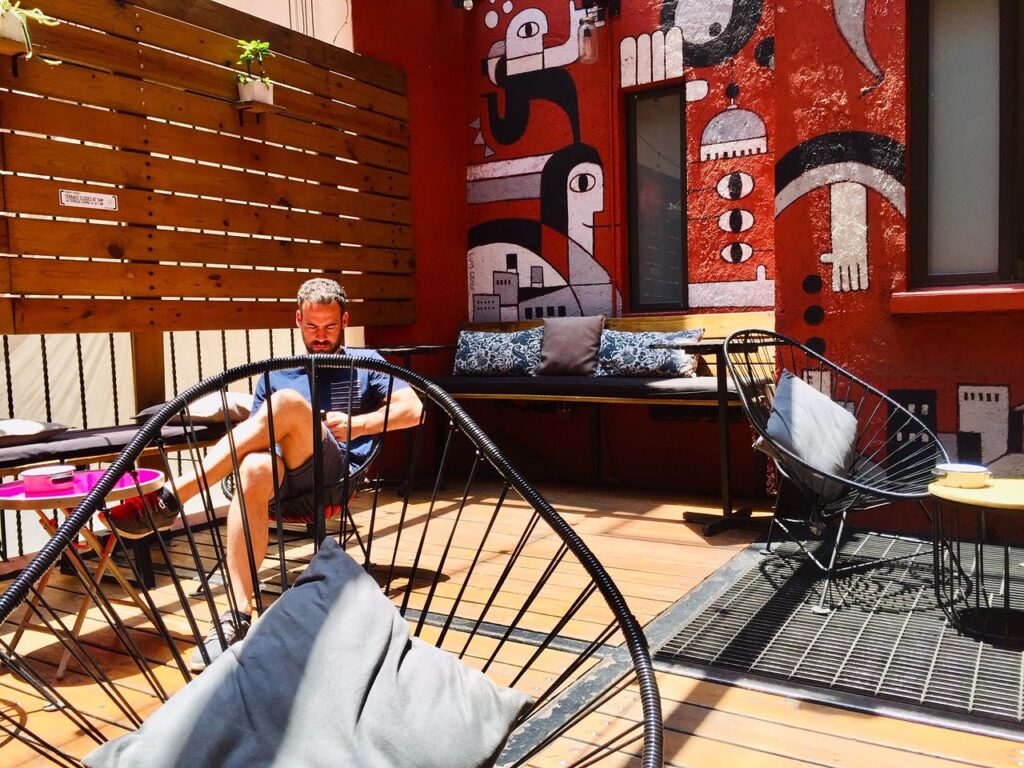
The hostel has also installed a number of eco-friendly upgrades to the building, such as energy-saving light switches and light sensors, water-saving toilets and shower heads, and energy-efficient appliances. Hostel Suites DF has teamed up with local tour operator Brisa Tours to offer daily cultural excursions with destinations, including Taxco/Cuernavaca, Puebla/Cholula, Xochimilco, and Teotihuacan, as well as walking tours of the Historical Center.
Located within 10 minutes of both the metro and metro bus, the hostel actively promotes the use of public transportation, as well as Eco Bici, the city’s bike-sharing system. On Sundays, they have guided bike tours during Muévete en Bici, a weekly event when major thoroughfares are closed to motorized transportation and open to the public via bicycle.
Eco-friendly Tour Companies in Mexico City
Azteca Travel Tours
In 2004, husband and wife duo Lidia Herrera and Peter Winkers began Azteca Travel Tours mostly as a hobby and as a way to share their love of travel with others. Over the next six years, Azteca Travel Tours grew organically as word spread between family, friends, and acquaintances. Soon, they began to attract clients outside of their immediate social circle. In order to meet growing demand, they revamped their cultural tour offerings in 2010 to provide more variety for both foreigners and locals.
Lidia, born and raised in Mexico City, and Peter, a Dutchman who originally came to Mexico City on a temporary assignment, seem like an unlikely pair. However after ten minutes with them, their passion for their work is unmistakable. Lidia comments affectionately that Peter has a corazón mexicano (a Mexican heart) and has a deep respect for its land and culture. The couple is inseparable and rarely conducts tours without each other. As they guide trips every Saturday and Sunday, weekends off are few and far between. However, they are grateful that each trip offers them a way to grow as individuals and as a company.
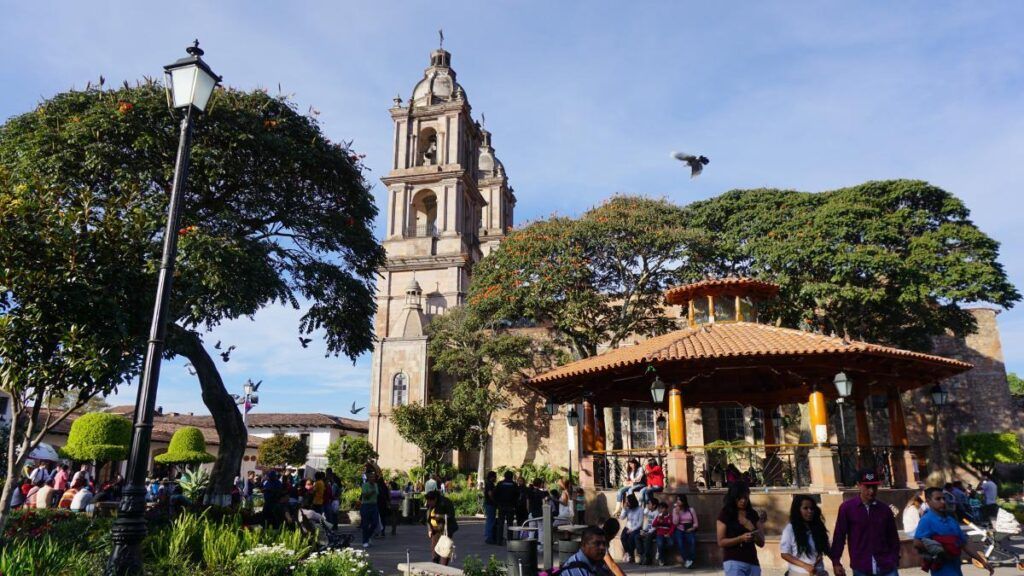
It brings them great joy to show the natural beauty, customs, and traditions of un México escondido (a hidden Mexico), and to change the negative perception that oftentimes plagues the country. Lidia and Peter are constantly diversifying their products and services. Day trips to lesser-known Pueblos Mágicos (declared magic towns by the Mexican government), like Malinalco, Valle de Bravo, Real de Monte, and Tlaxcala are offered every weekend, as well as visits to natural wonders and archeological sites, such as las grutas (deep underground caves), Cascadas de La Concepción (the waterfalls of conception), and Tula de Allende (capital of the Toltec Empire). Two to three-day weekend trips to destinations such as Veracruz, Guadalajara, Acapulco and Ixtapa are offered once a month and average between 1,500 – 3,500 pesos.
Between November and March, travelers can join in on a bi-weekly excursion to one of the monarch butterfly sanctuaries. Another tour includes a day trip to the Piedra Herrada sanctuary in the morning, a stop in the town of Valle de Bravo, and a boat ride on the lake. Azteca Travel Tours keeps prices low not only to appeal to foreign travelers but also to encourage locals to participate. Their 12-hour, bilingual day trips (7:00 AM – 7:00 PM) are between 600-700 pesos, and groups average between 4-10 people. Although Lidia is a certified tour guide, the couple often brings on local guides to add different perspectives and to support local operators.
Estación México
The free walking tour craze has hit Mexico City, and this local outfit is leading the pack in tours on foot. At Estación México, the guides contribute their knowledge, happiness, and personality in order to share the best stories, legends, and myths that are hidden deep within the city streets. They believe that the only way to discover the secrets of Mexico is to walk it. Their Free Centro Histórico Tour, which meets in front of the Metropolitan Cathedral every day at 11:00 AM, is an excellent way to orient yourself and learn about the city’s intricate, hybrid history of Aztec and Spanish culture.
If you have more time in your itinerary and want to immerse yourself in the artist’s neighborhood of Coyoacan, sign up for their Free Coyoacan Tour, which meets in front of metro stop Viveros every day at 3:00 PM. The positive energy and spirit of the local guides are infectious, and you will leave not only more educated but with a day full of laughs and memories. An appropriate tip for each three-hour walking tour would be 100-150 pesos. For the traveler who is looking for further immersion into Mexican culture, Estación México offers an array of more adventurous tours.
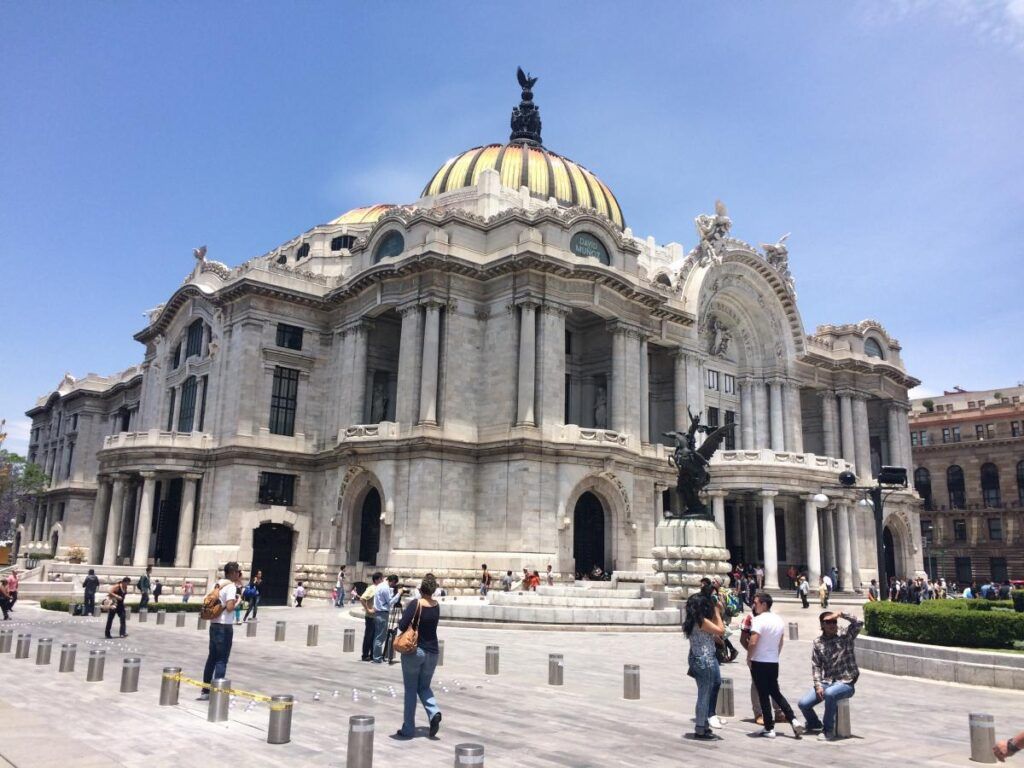
The Sábado de Ficheras Tour introduces you to one the best cabarets in town, complete with live music of cumbia and salsa, as well as three beverages for only 350 pesos. The tour starts at 10:00 PM, during which visitors are offered a ride to the cabaret, but after the tequila starts flowing, you are on your own for a ride back (and not to worry, tour guides will advise you of safe options to arrive back to your hostel).
Thursday night is the popular Pa’ Todo Mal, Mezcal Tour (roughly translated: for everything bad, mezcal), which departs from El Palacio de Bellas Artes at 8:30 PM. For 350 pesos, you will be educated on the history, ingredients and flavors of mezcal through various tastings, along with some antojitos (snacks) and live mariachi music to accompany. By the end of this tour, you will most certainly be an expert on this prehispanic beverage and have a deeper understanding of the Mexican saying, al mezcal, hay que tenerle respeto (towards mezcal, you must have respect).
Three nights a week, for 400 pesos, you can join one of Estación México’s Lucha Libre Tours and marvel at Mexican wrestling. Watch as grown men in elaborate costumes and colorful masks put on a wrestling spectacle, complete with dramatic flips and jumps, for a rowdy Mexican crowd. Before the show, you will make a quick stop at one of the most famous pulquerías in Mexico City to sample pulque, an alcoholic beverage made from the fermented sap of the maguey (agave) plant (check their website for dates, times, and meeting locations).
Urban Adventures Mexico City
Urban Adventures, a division of Intrepid, is a trailblazer in the sustainable tourism movement. In Mexico City, UA offers a variety of off-the-beaten-path tours, such as the informative Hidden Mexico City Tour, the lively Lucha Libre, Mariachi and Cantina Tour, the extensive Markets Tour, and the enlightening Hidden Teotihuacan Tour. They never permit more than 12 people at a time, and if there is high demand, they will split the group into two and bring on another guide. In the full, 13-hour day Markets and Hidden Teotihuacan Tour, you are exposed to the nitty-gritty side of Mexico City.
You start the day at the lesser-known Mercado Mural, which is covered in murals by Diego Rivera and some of his student prodigies, such as Marion Greenwood. Next, you catch a ride on the local public bus (similar to the chicken buses of Guatemala) to the massive Mercados Merced and Sonora, where your local UA guide leads you through the mystifying Sonora Witchcraft Market. It is said that 90% of catholic Mexicans have other indigenous beliefs or superstitions, and here in this corner of the market, one can find just about anything to meet their spiritual needs, such as Chinese herbs, statues of la santa muerte (the drug cartel’s saint), voodoo dolls, incense, dried squirrels, snakes and much more!
The last stop is the technicolored and vibrant Mercado de Jamaica, famous for its extensive flower selection and overabundance of food stalls. Food samplings throughout the morning include tamales, tacos de barbacoa (lamb) and cecina (beef), aguas frescas (fresh flavored waters), huaraches (thick tortillas with toppings including green or red salsa, onions, potato, cilantro, pork, chicken or beef and queso fresco), chapulines (fried grasshoppers), local fruits like mamey, zapote and jicama, as well as traditional Mexican sweets and candies.
The second half of this jam-packed day takes you an hour north of the city via public bus to the spectacular Pyramids of Teotihuacan. You will feel a bit of the altitude after climbing up and down both the Pyramid of the Moon and the larger Pyramid of the Sun, but the views are worth it. Your next stop is the home of Miguel and Marina in the neighboring town of San Francisco Mazapa. Their family has been creating works of art from volcanic obsidian stones for over 50 years.
After Miguel shows you their quaint workshop, you can watch in amazement as he models the different uses of the maguey plant, such as ixle (thread), pulque (a prehispanic alcoholic drink), and a special paper used to make a popular Mexican dish called mixiote (pit-barbecued meat wrapped paper from the maguey plant and cooked with special herbs).
Your next stop is Agroindustrial Teotihuacano, a family-run business operated by Doña Tele and her two daughters. This place specializes in products made from xoconostle and tuna, the two fruits yielded by the cactus plant. At your last stop, you are welcomed into yet another cozy Mexican home, where you share a savory dinner with products from local, organic farms.
Eco-Friendly Restaurants in Mexico City
Restaurante Roldán 37 (Centro Histórico)
- Address: Calle de Roldán 37, Centro Histórico, Mexico City (between Uruguay and El Salvador)
- Hours: Open every day from 12:00 PM – 7:00 PM
- Average price: 100-175 pesos per plate
Roldán 37 is located on the quiet, pedestrian-only street in the energetic neighborhood of La Merced, in the Historical Center of Mexico City. Head chef and owner Rómulo Mendoza has fond memories of the house that became the successful restaurant, Roldán 37, which was purchased by his grandparents over 100 years ago. At the time, the downstairs operated as a bodega (storage area) for chiles in the 19th century. Rómulo’s family was the first to grow and sell large amounts and varieties of chiles at the vast Mercado Merced, the same place where boats would arrive from the canals of Xochimilco to unload their vegetables and fresh flowers.
Mendoza credits his passion for cooking to his beloved grandmother, Doña Yolanda, who ultimately motivated him to remodel the old house into a gastronomical center. All of the products used at Roldán 37 (aside from the fish, which comes from Veracruz) are 100% Mexican and are purchased at the neighboring market, La Merced, to ensure quality and freshness. The restaurant offers a rotating menu. However, at least two to four varieties of chiles rellenos are guaranteed, which are the specialty of the house and highly recommended. Chiles rellenos, at Roldán 37, are hot, green, poblano chili peppers stuffed with a meat mixture, breaded and seared, then doused in a manchego cream sauce and served alongside rice and blue corn tortillas.
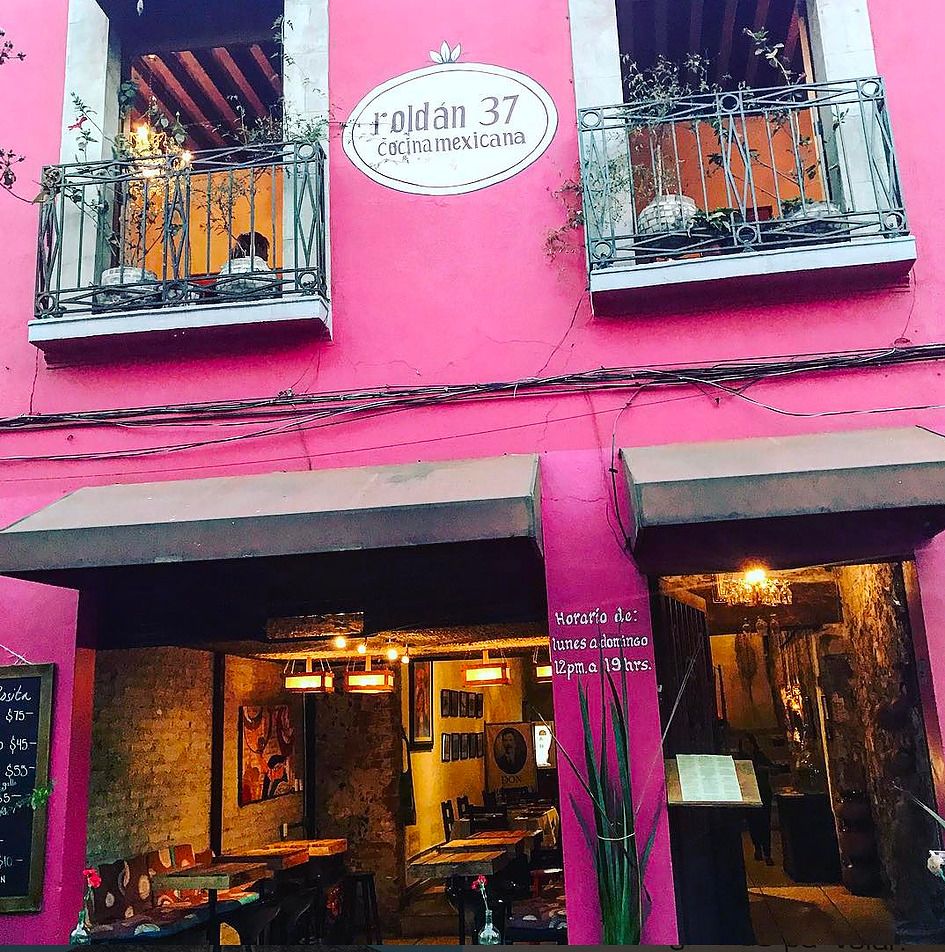
Make sure to save room for dessert and try Pastel El Roldán, which is Chef Mendoza’s version of tres leches (a dense, moist “three milks” cake topped with a rum reduction sauce and nuts). Beverage options include fresh lime margaritas or, for the adventurous bunch, a shot of top-shelf tequila served in a small chile. Mendoza recounts that when his family members would come home from a long day, glasses were scarce, so they would simply grab a chile from la bodega, cut off the top, and serve the tequila there.
Chef Mendoza believes that the best way to pass down the culinary traditions of one’s family is to not just see and taste the final product, but to witness the blending and transformation of ingredients into these exquisite dishes. In essence, to be an active participant in maintaining the tradition. Fluent in English, Mendoza offers cooking demonstrations for groups of four or more. The price of $25 gets you a private audience with the head chef and a demonstration of the preparation of the food, copies of a few recipes taken from his grandmother’s cookbook, and, most of all, a full and highly satisfied panza (tummy).
Café Ruta de la Seda (Coyoacán)
- Address: Calle Aurora 1, Coyoacán
- Hours: 8:00 AM – 10:00 PM
- Average price: 75-125 pesos per plate
After spending the morning at the Frida Kahlo Museum, take a “brunch break” at this modest cafe that sits on a narrow street corner in Coyoacan’s colonial center. With its unassuming, pastel-green walls and simple decor, you would never know that Café Ruta de la Seda (The Silk Route) is a true gastronomical treasure. As affectionately illustrated on the first page of their menu, at least 80% of their products are organic and originate from different regions of Mexico.
During the year, Café Ruta de la Seda works with more than 30 communities and sustainable organizations that follow strict fair trade practices and agroecological guidelines. Breakfast is served from 8:00 AM – 1:00 PM and includes Mexican staples, such as chilaquiles rojos o verdes (a blanket of lightly fried corn tortillas tossed in red or green salsa, and chicken). There are also some more international options, such as croque monsieur and madame, along with a quiche of the day. For those with a bold appetite, there are creative omelette options such as the Kuku Sabzi, a Persian omelette mixture of parsley, cilantro, dill, mint, chives, turmeric, and walnuts, served with a side of jocoque (yogurt cheese).
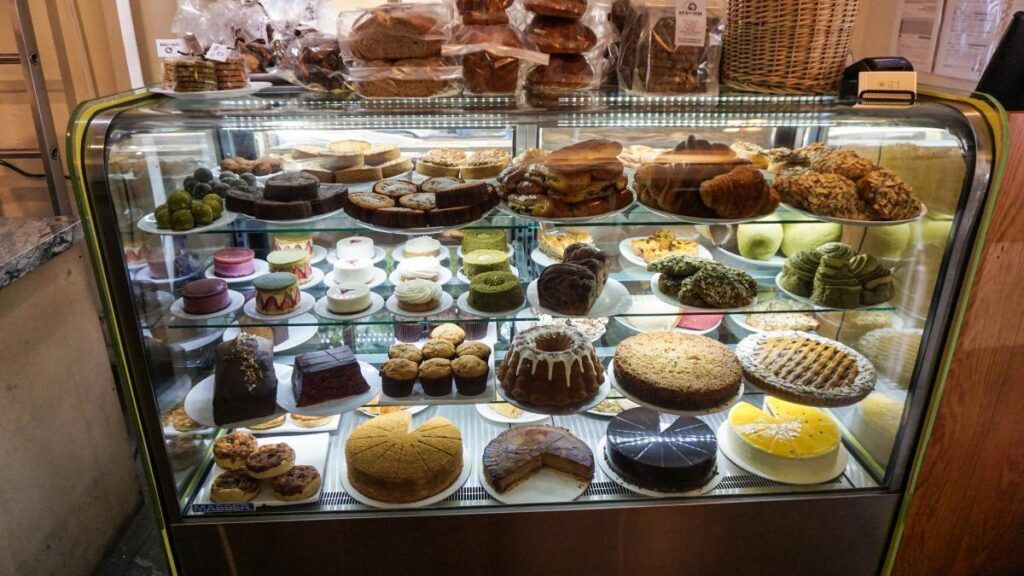
The lunch menu offers sandwiches served on their fresh baguettes and pan campesino, as well as organic salads. To wash it all down, try one of their elaborate lemonades like la vie en rose (infused with strawberries and rose water) or sherbert (made with orange blossom, mint, and cinnamon). Their fresh ginger beer is also a refreshing option! One of their greatest passions is la repostería, the art of preparing pastries, breads, cakes, and other desserts. Their savory and sweet bread varieties are made from carefully selected organic flours and are made fresh every morning. Try their conchas de mantequilla, cinnamon rolls with caramel and walnuts, or empanadas with guayaba puree and sweetened cheese.
Savory bread options include pan de vino, pan campesino, and challah. Their rotating dessert menu of tarts, mousses, cakes, truffles, and cookies is guaranteed to satisfy all of your cravings. The chocolate used to make all of their desserts is 100% Mexican and comes from various fair-trade cacao producers. To balance out the sweetness, be sure to order one of their organic tea varieties. Their selection occupies the last three pages of the menu!
Pan Comido (Roma Norte)
- Address: Calle Tonalá 99, Roma Norte
- Hours: 9:00 AM – 10:00 PM
- Average Price: 75 – 125 pesos per plate
Although the menu is entirely vegetarian, the food selection at Pan Comido strays far from dull or uninspired. Hamburgers, hot dogs, falafels, curry dishes, soups, salads, and gluten-free options adorn the menu. Offering extended hours, from 9:00 AM to 10:00 PM, this modest restaurant is the perfect spot to grab a bite to eat at any time of day. Breakfast is served from opening until about 1:00 PM until they switch over to lunch.
They offer an affordable rotating menu del día complete with a soup, a main dish, and an agua fresca (fresh fruit water). From the regular menu, top recommendations include pozole roja (a traditional Mexican stew with a mild chili flavor, made with hominy and vegetables served with tortilla chips and other toppings) and the red curry (a creative mixture of pumpkin, carrots, green peas, mushroom, and tofu served on top of jasmine rice). If you have got a sweet tooth after your long day of sightseeing, stop by for some of their sweet treats.
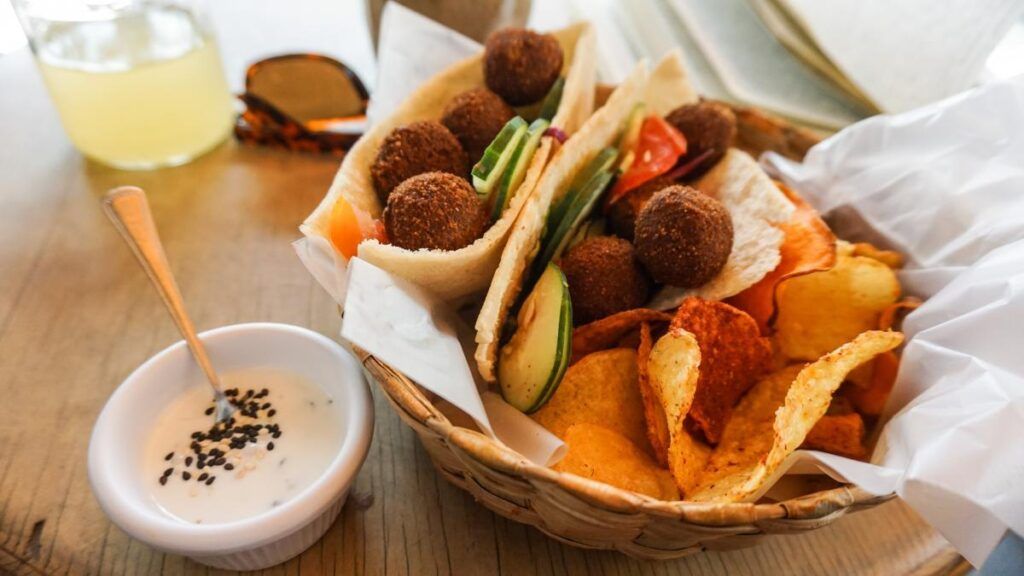
Try one of their sinful malteadas (milkshakes), the green tea with caramelized almonds and white chocolate is a solid choice. Or if ice cream isn’t enough for you, take a gander at their cookie selection: oatmeal with chocolate and almonds, pear with rosemary, peanut butter and cranberries, to name a few. The motto of Pan Comido, “Piensa en la naturaleza. Piensa en ti. Piensa en lo que comes” (Think about nature. Think about yourself. Think about what you eat.) captures the essence of their vegetarian creations and their dedication to using local and organic products.
Many products, like their coffee and chai, come directly from other local shops and producers within La Roma neighborhood. Like many Mexican establishments, service at Pan Comido is quite laid back, so this would be an excellent spot to read those chapters in that book you’ve been meaning to finish, catch up with a friend, or simply watch the passersby.
Eco-friendly Activities in Mexico City
Visit an Artisanal Market
Looking to support the local economy and bring back some handicrafts for your flat? Consider spending an afternoon strolling through one of Mexico City’s many artisanal markets. The best place to find local, handcrafted products is at La Ciudadela Artisanal Market in El Centro Histórico. Get lost in the maze of colorful stalls selling ceramic suns and moons, hand-painted blue pottery, amate art, carved wooden masks, glass pitchers, mirrors decorated with vibrant tiles, heart-shaped metal work, and blouses embroidered with colorful flowers. These products come from various states of Mexico as indigenous artisans come to sell their crafts in the nation’s capital. Take caution in taking photos as many artists are sensitive about people making replicas of their designs.
Go for a Bike Ride
Muévete en Bici is an event that takes place every Sunday from 8:00 am – 2:00 pm (check their Facebook page for updates), when major streets are blocked off for the public to enjoy walking, biking, rollerblading, and any other form of exercise! Here are some options for renting a bike in CDMX:
- Ecobici: While walking around the city, you will probably notice the rows of red Ecobicis, which is the city’s bike-sharing system. The card stations offer you the option to purchase a pass for 24 hours (90 pesos), 72 hours (180 pesos), or 7 days (300 pesos). Although Ecobici has had incredible success among commuters in Mexico City, keep in mind that: 1.) You can only use these bikes for 45 minutes at a time before you have to park and change it out for a new one (going over the allotted time amounts to extra fees being charged on your credit card). 2.) You will be charged a 5,000 peso deposit as a guarantee that you will take care of the bikes you use, which will be reimbursed to you within five days after your temporary hold expires.
- Rent a bike from Poray Biclaturs & Rentals: Simple and straightforward, Poray allows you to rent top-notch cruiser bikes and tandems starting at 50 pesos an hour or for up to a week starting at 900 pesos. You can also sign up for one of their daily bike tours offered at 450-550 pesos. Poray does not require you to pay a deposit; however, they do ask you to present your passport and provide a printed confirmation page of the hotel or Airbnb you are staying at. They have two locations: one on Paseo de La Reforma and the other in La Condesa neighborhood.
- Rent a bike for free: Free bike rentals are offered by the city at various locations, including next to the Cathedral, along Reforma, in Polanco, Condesa, and Roma. You can see a map of station locations here. Keep in mind that you must leave a credit card and passport to take a bike.
If you are not here on a Sunday, don’t worry! You can still rent a bike and spend the afternoon in Parque Chapultepec (The Urban Forest), which covers over 1,695 acres. There are a variety of museums within the park, such as The National History Museum located within the Chapultepec Castle, The Modern Art Museum, and The Anthropology Museum. It is best to enter the park through the gates on Avenida Juventud Heroica, which takes you directly to the El Monumento de los Niños Heroes (Monument of the Heroic Child Soldiers).
Once you enter the park, go left on Calz. Mahatma Gandhi for a joyful ride around the park and to avoid foot traffic. Lastly, on El Lago Mayor (the big lake), you can rent paddle boats for 70 pesos (it is advised to ride through the park on a weekday as weekends are highly overcrowded). On a final note, it is not recommended to bike on city streets on days other than Sundays due to a lack of bike lanes. One-way streets and disrespectful drivers can be dangerous for the unfamiliar tourist.
Check out more articles about Mexico:

